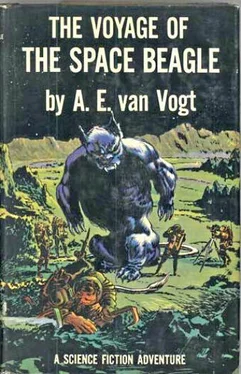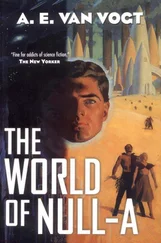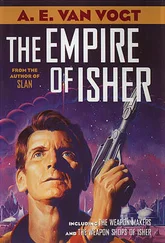Pennons nodded. And Smith carried on the thought. “It would appear that the creature was working on it when he suspected that something was amiss. He must have realized the truth, for he left the ship. That seems to discount your theory, Korita. You said that, as a true peasant, he couldn’t even imagine what we were going to do.”
The Japanese archaeologist smiled faintly through the fatigue that paled his face. “Mr. Smith,” he said politely, “there is no question but that this one did imagine it. The probable answer is that the peasant category amounted to an analogy. The red monster was, by all odds, the most superior peasant we have yet encountered.”
Pennons groaned. “I wish we had a few peasant limitations. Do you know that it will take us three months at least to get this ship properly repaired after those three minutes of uncontrolled energization? For a time I was afraid that….” His voice trailed off doubtfully.
Captain Leeth said with a grim smile, “I’ll finish that sentence for you, Mr. Pennons. You were afraid the ship would be completely destroyed. I think that most of us realized the risk we were taking when we adopted Mr. Grosvenor’s final plan. We knew that our lifeboats could be given only partial anti-acceleration. So we’d have been stranded here a quarter of a million light-years from home.”
A man said, “I wonder whether, if the scarlet beast had actually taken over this ship, it would have gotten away with its obvious intent to take over the galaxy. After all, man is pretty well established in it — and pretty stubborn, too.”
Smith shook his head. “It dominated once, and it could dominate again. You assume far too readily that man is a paragon of justice, forgetting, apparently, that he has a long and savage history. He has killed other animals not only for meat but for pleasure; he has enslaved his neighbours, murdered his opponents, and obtained the most unholy sadistical joy from the agony of others. It is not impossible that we shall, in the course of our travels, meet other intelligent creatures far more worthy than man to rule the universe.”
“By heaven!” said a man, “no dangerous-looking creature should even be allowed aboard this ship again. My nerves are all shot; and I’m not so good a man as I was when I first came aboard the Beagle.”
“You speak for us all!” came the voice of Acting Director Kent over the communicator.
Somebody whispered in Grosvenor’s ear, so softly that he could not catch the words. The whisper was followed by a trilling sound, as gentle as the whisper and equally meaningless.
Involuntarily, Grosvenor looked around.
He was in the film room of his own department, and there was nobody in sight. He walked uncertainly to the door that led to the auditorium door. But no one was there either.
He came back to his workbench, frowning, wondering if someone had pointed an encephalo-adjuster at him. It was the only comparison he could think of, for he had seemed to hear a sound.
After a moment, that explanation struck him as improbable. Adjusters were effective at short ranges only. More important, his department was shielded against most vibrations. Besides, he was only too familiar with the mental process involved in the illusion he had experienced. That made it impossible for him to dismiss the incident.
As a precaution, he explored all five of his rooms and examined the adjusters in his technique room. They were as they ought to be, properly stored away. In silence, Grosvenor returned to the film room and resumed his study of the hypnotic light-pattern variations, which he had developed from the images that the Riim had used against the ship. Terror struck his mind like a blow. Grosvenor cringed. And then there was the whisper again, as soft as before, yet somehow angry now, and unthinkably hostile.
Amazed, Grosvenor straightened. It must be an encephalo-adjuster. Somebody was stimulating his mind from a distance with a machine so powerful that the protective shield of his room was penetrated.
With a frown, he considered who it might be, and finally called up the psychology department as the most likely offender. Siedel answered personally, and Grosvenor started to explain what had happened. He was cut off.
“I was just about to contact you,” said Siedel. “I thought you might be responsible.”
“You mean everybody’s affected?” Grosvenor spoke slowly, trying to imagine the implications.
“I’m surprised you got any of it at all in that specially constructed department of yours,” said Siedel. “I’ve been receiving complaints for more than twenty minutes; and some of my instruments were affected several minutes before that.”
“Which instruments?”
“Brain-wave detector, nerve-impulse register, and the more sensitive electrical detectors.” He broke off. “Kent is going to call a meeting in the control room. I’ll see you there.”
Grosvenor did not let him go so quickly. “Has there been any discussion as yet?” he asked.
“We-e-1-11, we’re all making an assumption.”
“What’s that?” he asked quickly.
“We’re about to enter the great galaxy M-33. We’re assuming this comes from there.”
Grosvenor laughed grimly. “It’s a reasonable hypothesis. I’ll think about it, and see you in a few minutes.”
“Be prepared for a shock when you first go out into the corridor. The pressure out here is continuous. Sounds, light flashes, dreams, emotional turmoil — we’re really getting a dose of stimulation.”
Grosvenor nodded, and broke the connection. By the time he had put away his films, Kent’s announcement of the meeting was coming over the communicator. A minute later, as he opened his outer door, he realized what Siedel had meant.
He paused as the barrage excitations instantly began to affect his brain. Then, uneasily, he headed for the control room.
He sat presently with the others; and the night whispered, the immense night of space that pressed against the hurtling ship. Capricious and deadly, it beckoned and it warned. It trilled with frenzied delight, then hissed with savage frustration. It muttered in fear and growled in hunger. It died, revelling in agony, and burgeoned again into ecstatic life. Yet always and insidiously it threatened.
“This is an opinion,” said somebody behind Grosvenor. “The ship ought to go home.”
Grosvenor, unable to identify the voice, glanced around to see who had spoken. Whoever it was said nothing more. Facing forward again, Grosvenor saw that Acting Director Kent had not turned from the eyepiece of the telescope through which he was peering. Either he considered the remark had been unworthy of reply, or else he hadn’t heard it. Nor did anyone comment.
As the silence continued, Grosvenor manipulated the communicator arm of his chair, and presently he was seeing a slightly burred image of what Kent and Lester were gazing at directly through the telescope. Slowly, then, he forgot the spectators and concentrated on the night scene shown by the plate. They were near the outer environs of an entire galactic system; yet the nearest stars were still so far away that the telescope could barely resolve the myriad needle points of brilliance that made up the spiral nebula, M-33, in Andromeda, their destination.
Grosvenor glanced up just as Lester turned from the telescope. The astronomer said, “What is happening seems incredible. Vibrations we can actually sense, spilling out from a galaxy of billions of suns.” He paused, then said, “Director, it seems to me this is not a problem for an astronomer.”
Kent released his own eyepiece and said, “Anything that embraces an entire galaxy comes under the category of astronomical phenomena. Or would you care to name the science that is involved?”
Читать дальше











